#sandman character analysis
Explore tagged Tumblr posts
Text
The Truth of Mankind…
…Is Also Dream’s
These quotes are from episode 5 (24/7):
“Garry dreams of proving his father he was wrong about him.”



“Kate dreams of running away where no one will find her.”


[But you do, and we see your star in so many panels of The Wake 🥺]



“Bette dreams of creating something that matters to people.”



You are the magician who became the man, Morpheus. And you are the king who left his kingdom, but not without making sure everyone else would be okay first--perhaps that is a different definition of a graceful ending, but it is graceful nonetheless.
You’re so painfully human, and yet, you are also not 😭
#the sandman#sandman#dream of the endless#morpheus#the sandman netflix#the sandman comics#sandman meta#sandman analysis#sandman character analysis#sandman spoilers#overture spoilers#mother night#father time#william shakespeare#the kindly ones spoilers#the wake spoilers#exiles spoilers#the tempest sandman spoilers#Garry Fletcher#kate fletcher#bette munroe
607 notes
·
View notes
Text
The Corinthian: more than an object but less than a human and a wretched reflection of his creator
My obsession with the Corinthian is so funny because at first it's like ok. Cool. He's this gay serial killer nightmare with creator issues who's turns out to be a charming antagonist while he's pitted against dream and going about his nefarious plans on screen. What's not to love?
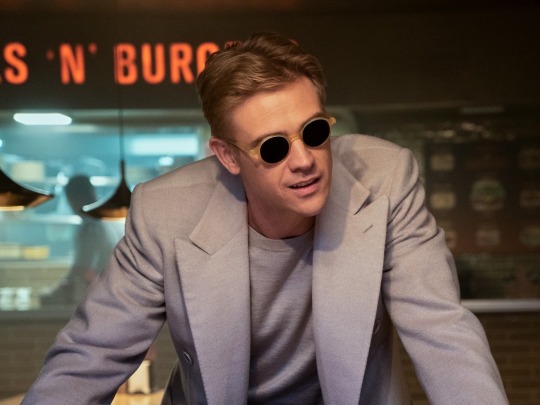
But then there's the next layer of oh...he has preferences and quirks and interests, but he's not a person enough to be a human he's a tool.. that's why he gets unmade in the middle of the street by his lord!! That he had a couple millennia of history with!! Because it's easy.. Dream has the blueprints, therefore remaking the Corinthian and editing out these faulty design aspects is pragmatic. It's efficient. It's less effort and way less emotionally taxing that trying to wrangle in your rogue creation and trying coax them back into doing their job. A human makes a mistake, you correct and reprimand them and offer a better course of action. But if your wrench rusts, you throw it away and buy a new one. It doesn't matter if it's your prized or even your favorite wrench, if it's been rusted to the point of uselessness, you toss it.
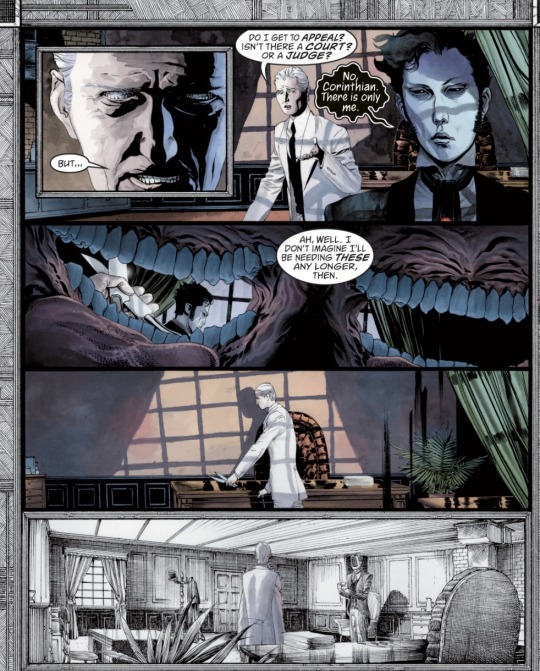

And the Corinthian, the agonized wrench, can probably only think: "Did I really mean so little to you?"
I think it totally fucks with his mind. The fact that Dream refers to the Corinthian as his masterpiece and yet he is still lesser in every form of his being—his agency is lesser in every form.
But you can't really blame Dream, can you?
Dream treats the corinthans agency like he treats his own—unnegotiable. For him, it has always been perform your function or die.

Dream: We are, each of us, born with responsibilities. Even I am not free to choose to be other than what I am.
And the Corinthian, in his own eye teeths, has performed his prescribed duty perfectly without hesitation or fail for thousands of years as well and worn as a well used knife—but he knows he can do more, so he does. Because if his function is to chase and slaughter in the dreaming, what's to say can't do it in the waking too?
Besides, in the waking, he's realer. More combobulated. More valued. If you're a mirror for long enough you start to crave a look of your own.
And oh, even with the thrill of newfound freedom, he loves his lord. He's eager for to give to him—to share with him—everything that's ever been dreamed of. In the Corinthians long, long, life he has only ever had his purpose and his lord and for a while that was enough, but his expectations evolve, he changes.
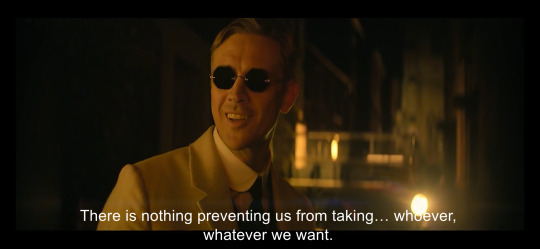
And that's really what dooms him.
Over the course of The Sandman you can see that looking deeper into Dream's ideology "perform your function or die" reveals one of the true themes of the sandman which is "change yourself or die." The Corinthian, whether intentionally or unintentionally serves as a mirror to dreams own character arc and the way dream treats himself.
Like how people put facets of themselves in their original characters, I think that in the corinthian Dream put a version of his own insatiable hunger; to break every rule, to run freely, to enjoy hedonistically. In creating the Corinthian as a mirror Dream unknowingly reflected a distorted face of one of his own buried desires—and i think he couldn’t accept that.
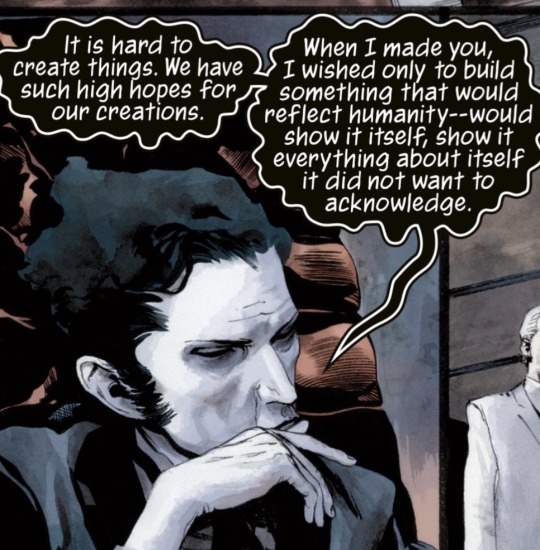
The Corinthian even calls dream out for it at the serial convention (even though he's advocating for murder) he's also jabbing at Dream's unwillingness to show emotional vulnerability and the cage he's built around himself.
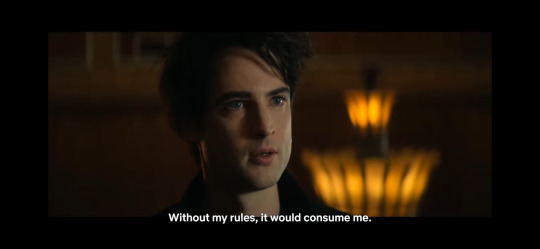
Corinthian: Or you might actually feel something.
The dream the Corinthian knows he always cared exceptionally little for humans save for a select few, so what remains is this. Dream might've cared for the Corinthian, but he would unmake him, his prized creation, not for any moral justice, not for a personal slight, but for his rules and nothing else.
For the corinthian, who has spent years upon years upon years with his lord, fighting in his wars, chasing after his approval, pouring every ounce of love and loyalty to him—it stings.
And then there's this scene.

Dream: You're right. This was my fault, not yours. I had so much hope for you. But I created you poorly then.
This is the Corinthian, knowing he is about to die, spilling his frustration and spite to his creator for maybe the first and last time and trying, desperately, to make dream understand that none of this is fair (it's never been, for either of them. It's been the function and nothing else for an eternity but they could be happy.)
This is Dream purposely misinterpreting the Corinthian in the way that is guaranteed to hurt the him the most. Dream, with a writer's indifference, reduces the Corinthian's complicated desperate desire for freedom, rebellion, and his creator's love to his typo. Like a character’s grievance towards their writer, like a man’s outrage towards their god, Dream decides not to deign the corinthian with even the right to call his treason his own. He will not even let him have that bit of agency. No, Dream made the Corinthian wrong.
And then Boyd Holbrook does a phenomenal piece of acting here—he knows how to play evil and charming so well but the Corinthian’s vulnerability is so starkly on display it feels like a knife.
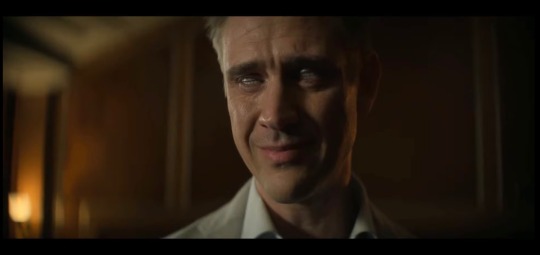
And when you imagine he is about to burst into bloody tears and anguished final words, this is how it ends: they leave each other cruel and jagged, because the corinthian will not end pathetic and he will have the last word.
The Corinthian: I am only sorry I won’t be here to see Rose Walker do the same to you.
The first Corinthian never gets a happy ending.
I don’t think there’s any universe where he doesn’t bite more than he’s allowed to and there is no world where he can really be forgiven. As there is no universe where Morpheus Dream does not stubbornly tie himself to his function and hurt himself and those around him with his pride.
In objectification and the inability to change, they exist as wretched mirrors of each other: The first Corinthian, sick of his function and executed for abandoning it, and Dream, unendurably tired, taking his sister's hand in his when he can no longer bear to perform his duty.
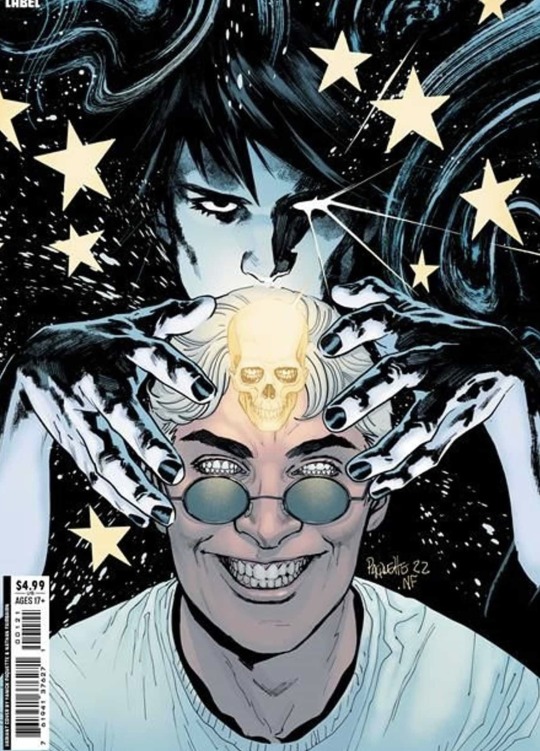
#sandman spoilers#this is literally just me going on a long winded and poorly organized tangent 😭#the sandman#the corinthian#dream of the endless#corintheus#character analysis#musings#long post
540 notes
·
View notes
Text
Hob vs Shakespeare: or capitalism vs Art (and the corresponding visions of immortality)
written for The Sandman Book Club
Leaving aside the holy transfiguration that has been made by fandom in recent years, the character of Hob is very significant. Representing the literary topos of the ordinary man, the man without qualities, the all-too-human human, he is characterized not by his virtues (and if we want, not even by his vices) but precisely by being a normal, banal creature, as all human creatures are in the eyes of the gods.
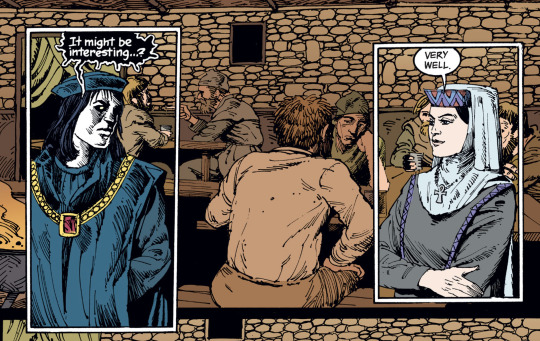
Hob's entry in Men of Good Fortune also has countless references in mythological literature. Two deities, Death and Dream, who observe human beings with the curiosity of those who never, or almost never, get down in the middle but are always up high (It might be interesting...). Can eternity be humanly bearable? Can a human being eternally refuse the embrace of death? It reminds me a little of the wager between God and the Devil on poor Job in the Bible: will Job be able to endure the most terrible misfortunes without denying the name of God?
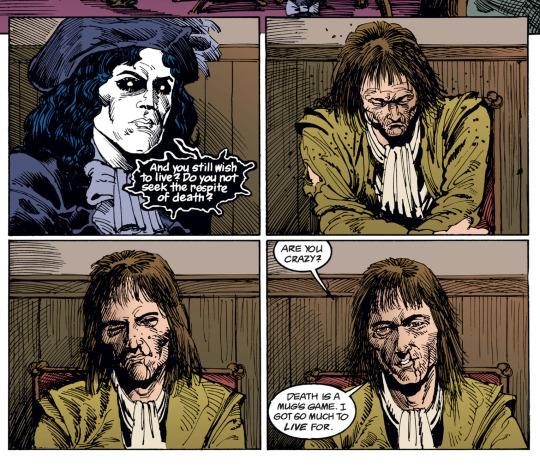
But Hob isn't a man of faith. He does not see in eternal life a means to elevate himself as a human being but to enjoy earthly opportunities. He is an entrepreneur, an ante litteram capitalist: whether it is the war, the printing or the slave industry, Hob's actions have value as instruments to make money and a high standard of living. Love and pain, however great and lacerating, do not deter him from the one constant goal in a life full of ups and downs: to live forever. The ambition, precisely, of an ordinary man without qualities, whose interpretation of eternity can only coincide with the desire for the eternal, abundant satisfaction of materialistic needs.
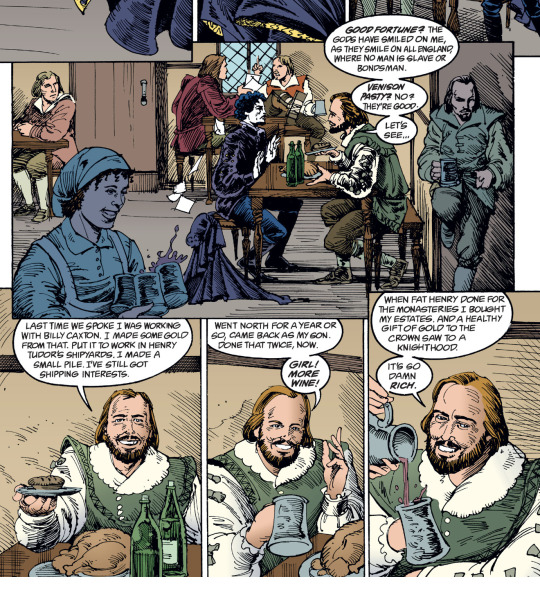
Hob's vision of immortality is particularly jarring in a story full of great writers' cameos. Chaucer. Marlowe. Shakespeare. Immortals too, of another idea of immortality, achieved through art. There could not be a more stark contrast between these two visions and it is no coincidence that Hob's immortality is the result of a game between gods and human while that of the artists often is a deal with the divinity, be it benevolent or malevolent. Hob's immortality is an immortality without sacrifice, or rather, without there being anything really worth sacrificing for: no love is so great as to make him give it up. The immortality of the artist, on the other hand, is one for which the artist sacrifices everything, primarily himself.
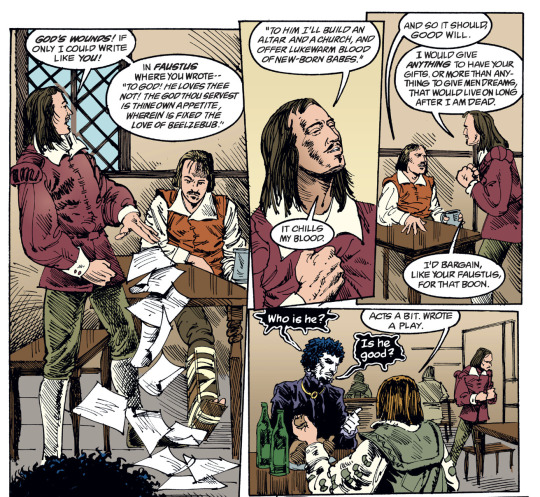
Yet it is not the immortality of artists that we identify with. It fascinates us, seduces us, but it is to the immortality of the common man, the immortality of Hob, that most of us would look with envy. Capitalist immortality in a capitalist society: Live & Consume. Forever.
54 notes
·
View notes
Text
CHARLES ROWLAND RANT INCOMING:
I think Charles is in love with Edwin and I can tell you why I think that. Charles doesn’t know love, not the kind of love Edwin has for him. He’s used to probably quick hook ups and infatuations when he was alive and then his home life included abuse and his supposed friends murdered him. Charles is a lover, but he doesn’t know love when it’s directed at him. His relationship with Crystal is familiar, probably similar to the flirtatious style he used to use before. BUT when they kissed Charles focused to feel it in his mind. We know that. He used memory of kissing to make the image and feeling as real as possible.
Now let me explain why Charles is in love with Edwin and really it’s quite easily explained with a single moment. Sure we can talk about the Monty/Edwin jealousy, the smirks and obvious checking out Charles does of Edwin every five seconds but it’s so much deeper than that. In the beginning of the show Charles and Edwin hug, something that is familiar for the rest of the show. But this hug, Charles rubbed his chest, he laid his palm over his heart and rubbed softly looking down in confusion. HE FELT SOMETHING it’s unfamiliar it’s new and he has no idea what to name it so he calls it love for his best friend. He names it affection and he says “you’re my best mate” because that’s as close as he can get to naming this feeling.
Charles doesn’t know what it’s like to be in love, not consciously, so this unique love he has for Edwin? He chalks it up to something else. I mean Edwin just learned to name his own feelings what makes y’all think Charles is any more adjusted when his whole arc in season one was his ability to protect through violence but his desire to be soft and kind and happy for his friends?
They’re both disasters. Now please renew the damn show so I can see them work through it all together.
#dead boy detective agency#dead boy detectives#charlesxedwin#charles rowland#edwin payne#character analysis#painland#niko dbd#niko sasaki#crystal palace#the sandman#neil gaiman#lgbt#mlm yearning#bisexual charles rowland
107 notes
·
View notes
Text
i love viktor in the same way that i love dream of the endless
#idk if that makes much sense#but i hope this reaches the targeted audience lmao#i cant help but go insane over how much i looove viktor#the thing is this kinda felt familiar nd i couldn't put a finger on what it was exactly#now i know lol#this was a kind of epiphany i had yesterday lmao#dream of the endless#the sandman#viktor arcane#that man is gorgeous#both of them are actually#i CANNOT comprehend any deep analysis as to why i think they're similar#im just going absolutely batshit insane over how muchh i love this character
11 notes
·
View notes
Text
Random though: As someone who really likes contrast in pretty much everything (clothing, hair color, decoration) now that I’m drawing Cori I realize how monochromatic and “boring” his color palette is, especially in the show, not that I haven’t realized watching his scenes before but when you draw him is even more noticeable
#pretty sure this could lead to some interesting character analysis but I lack the neurons to do it#will probably post said drawing soon I hope#the corinthian#the sandman#my posts#the corinthian fanart
11 notes
·
View notes
Note
When has Dream ever committed war crimes? I swear you dream haters like making up shit as you go along.
"Dream hater"? Me???
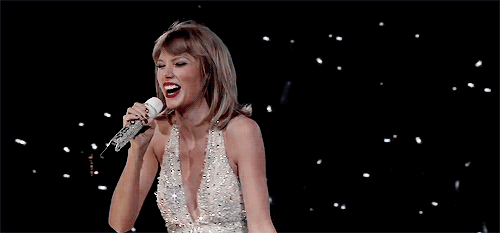
Okay, okay, I KNOW you're never supposed to respond to anon hate but this legit made me laugh! For real! Dream is one of my favorite characters ever! That does not mean he is always the nice soft good boy that the fandom likes to pretend he is!
I'm not the OP of that post, but to me it seems clear that they're using "war crimes" in the fandom slang sense of "he's an asshole who did bad things". Which he is for the majority of his existence! There are very few people he is genuinely nice or friendly with! Also, some of the stuff he does arguably could fall afoul of the Geneva Convention if he'd done them as part of an international conflict... which, like. That's not great if you're having to argue on the technicality of "but the wrongful imprisonment and torture wasn't part of a war!"
And him being a terrible person/personified existential concept is an integral part of the plot. The overarching question of the entire series is "can he change?" and its tension with whether or not HE believes he can change! And I felt the actual ending of the books answered those questions in such an unsatisfactory manner that I wrote an entire detailed essay about it... I'd say that's beside the point, but you did say I was a "Dream hater" and well, you don't write academic papers for fun about characters you truly despise.
Everyone in Neil Gaiman's Sandman universe is INCREDIBLY morally grey! That's part of the point! Every single one challenges the reader to think about what they value, how they interpret the character, etc. And even if you think a character is a jerk, or even evil, that doesn't mean you can't enjoy them as a character. That's the magic of fiction! But if you completely ignore half of their actions... do you even like the character at all?
#asks#asks answered#the sandman#the sandman meta#neil gaiman's sandman#anon#character analysis#dream of the endless#comedy#original post
30 notes
·
View notes
Text
Only Hope (!) calls you out like that…
Since I’m currently in the process of writing the mother of all “H/hope in the Sandman”-metas, just a couple of random panels about Hope, Dream and Desire. This one, obviously everyone talks about quite often…

And this is doubly important since this happens after a certain 1889 meeting, but before the fishbowl. So Dream didn’t have the experience of being captured yet that furthered his change. And yet, his reaction to her is very different than the reaction to Hob (also: Can we talk about the symbolism in Hope reaching out her hand, touching him and his allowing it?). Because she is Hope.
(And innocence I dare say—she is a child for a reason.)
But the panel hardly anyone ever talks about is this one:
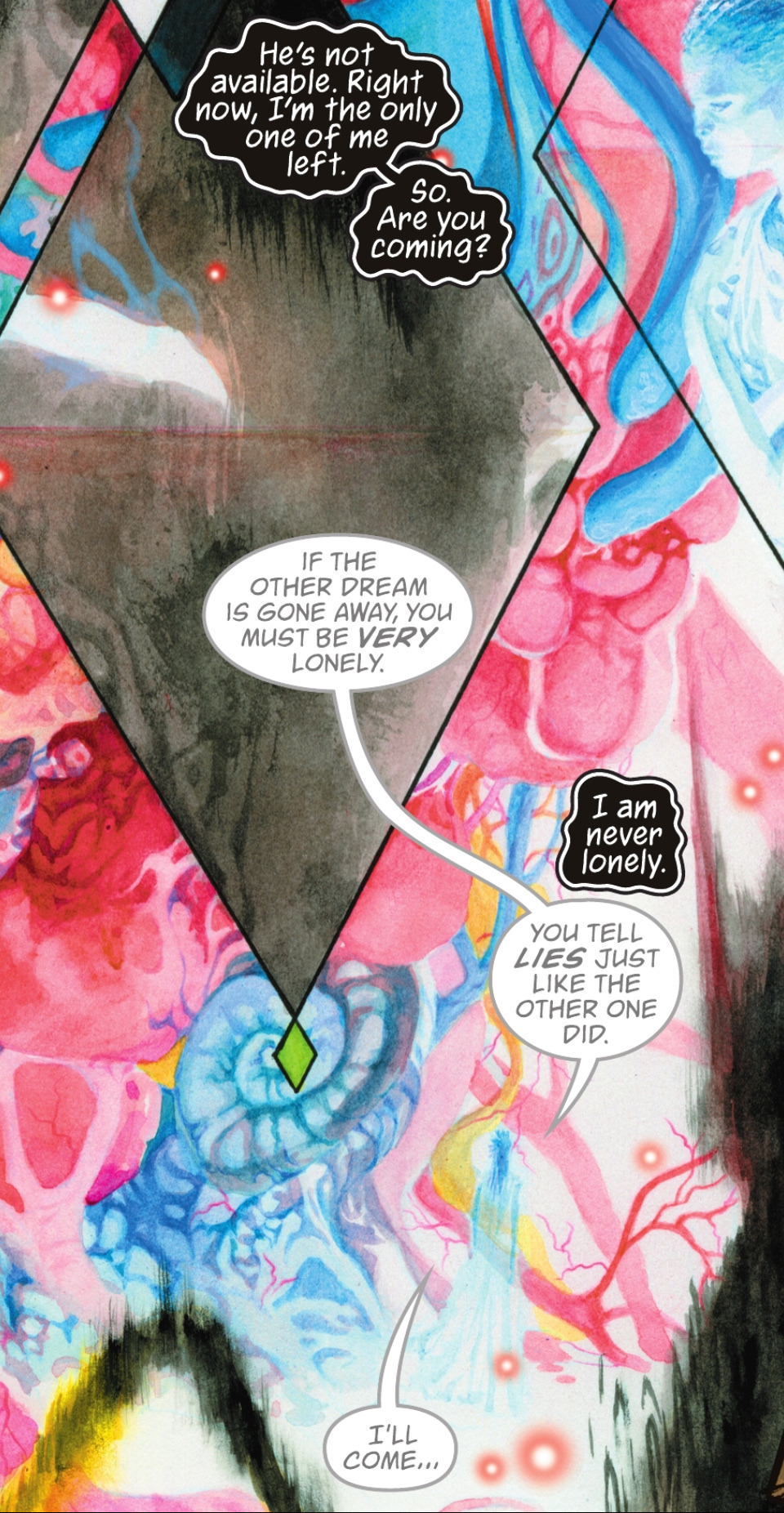
That’s Hope saying the exact same thing to Desire. And they have the same reaction. And she calls them out on their bullshit in exactly the same way. (And again, can we talk about the symbolism in asking Hope to join you and her replying she will come with you? That’s more than just the obvious “We’re saving the universe and you stand for the afterlife”, which is also a biggie, but that’s for the other meta). Because she is Hope.
Both Dream and Desire are so lonely (I’d hazard a guess she could say this to all the Endless btw). And they both cope with it in such maladjusted ways. But they let a child call them out like no one else is allowed to call them out. They bristle, but they don’t overreact like they do with others (especially Dream). Because she is Hope.
(And all of that’s to say: She is the personification of H/hope, not any of the other side-characters that commonly get hope projected on them. And D/dream(s) are hopes and always will be because she touches/d them.)
#the sandman#sandman#dream of the endless#desire of the endless#morpheus#the sandman comics#hope beautiful lost nebula#sandman overture#overture sandman#sandman spoilers#sandman meta#sandman analysis#sandman character analysis#sandman bookclub#queue crew
383 notes
·
View notes
Text
youtube
#Part character study part 1x11 analysis#also kind of a crossover#the sandman#Sandman#sandman netflix#sandman neil gaiman#dream#lord morpheus#dream of the endless#Hadestown#Orpheus#orpheus and eurydice#orpheus x eurydice#Calliope#hob gadling#mine#reupload#changed it slightly#Youtube
5 notes
·
View notes
Text

@windsweptinred Yes!!! it's indeed a fascinating aspect and your tags made me think of how truly exceptional is, in Nightmare Country, that Daniel allows the Corinthian to investigate in the waking world (despite Lucien practically constantly propagandising against the Nightmare). Morpheus would NEVER have allowed it! It's true, he puts Madison Flynn near him as a 'control system', but it's actually a great transgression of those very rules in which Daniel believes, as you rightly write, fanatically!
And I also think back to the scene in Azazel's club, how the demon practically puts temptation at his fingertips but the Corinthian does not take it, goes ahead, follows the 'rules' but not in a servile way: following Daniel's rules is a way of asserting his role, in relation to the First and also in relation to Daniel.
Daniel and the Corinthian are united by being an exception, an 'anomaly' (pass me the term) within The Dreaming, and they are also united by the fact that they are each other's exceptions. For you, I will break the rules; for you, I will follow the rules.
my favorite ship dynamic is betrayal. not when they betray each other but when one or both of them turn against their cause, their principles and/or loved ones for the other. bonus points if the person they're abandoning everything for didn't remotely expect it. ultimate declaration of love. "you mean more to me than everything i ever believed in. i am more loyal to you than my conscience. i love you more than the thing i would die for."
#even putting aside the ship talk#it's evident in Nightmare Country that they have a special relationship#because like hell Morpheus would made the First go around doing investigations!#however the corinthielogy research is more active than ever u.u#really great food for thought my dear!#the sandman#the corinthian#daniel hall#characters&analysis
29K notes
·
View notes
Text
Playing with dolls: the Corinthian and "this dream people call Human Life" - part I
Written for The Sandman Book Club
Since at The Sandman Book Club we are re-reading The Doll's House, and since the first chapter of this story marks the entry of the Corinthian, I would like to dwell on some of the distinctive traits of this character, how he is the embodiment of one of the great symbols of American and Western pop mythology (the serial killer) and how the netflix adaptation, while excellent, has completely deprived him of precisely those elements that made him so distinctive, while enhancing other important aspects.
Murderer vs. Killer, or when killing is a "work of art"
In The Dreaming, the spin-off series immediately following the canonical Sandman, there is a panel that I think is emblematic in defining what the Corinthian is, even before his being nightmare, black mirror, etc
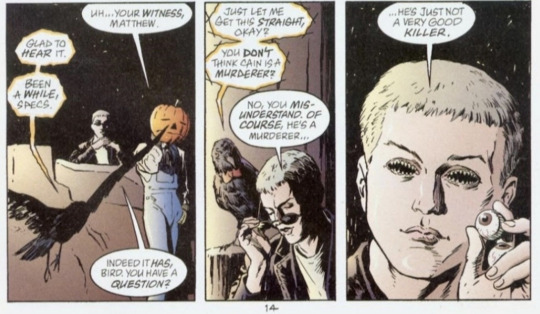
Judging Cain like he's on Dancing with the Stars
There is a passage in which the Corinthian states that Cain is definitely a murderer, but not a very good killer. This because the word murderer here is linked to a primordial concept of homicide. Yes, Cain is the first murderer, but his act is something instinctual, part of his nature. Cain kills because he cannot do anything else and murder for him is an inevitable act, demonstrating his being part of a story from whose narrative he does not escape.
For the Corinthian, on the other hand, killing theoretically is not in his nature: he is after all a nightmare, which must terrify, unsettle, reflect the deepest fears and secrets of the human subconscious. A means to an end, not the end itself. For the Corinthian, killing is a deliberate act by which he tries to carve out a space of his own within a predetermined story.
The serial killer is a planner: in the Corinthian mind, an artist too. Even the fact that he appears on the scene not already in his nightmare function but primarily in that of being ready to kill a young man leaves no doubt about it: the Corinthian, in the way he perceives himself, is first and foremost a serial killer/artist.
This is not Vogue: comics vs show


In the netflix Sandman, episode one, the Corinthian has sensed that Dream is free. He wipes off the blood from his eyes and stands up, sensually stroking the head of his...victim? It would be better to say a model without eyes. Death here is not horror: there is something glamorous about this scene that irritates me deeply, not least because we are watching it from a spectator's pov, comfortable in our chairs. We are in a hotel room but the space is open, and the screen of the devices from which we are watching the episode gives us
1) an escape route
2) a way to dilute the horror of the scene (there is always hope if there is an escape route)
This Corinthian is elegant and sensual. He could disturbs us, if he wants, but definitely he's not scary.
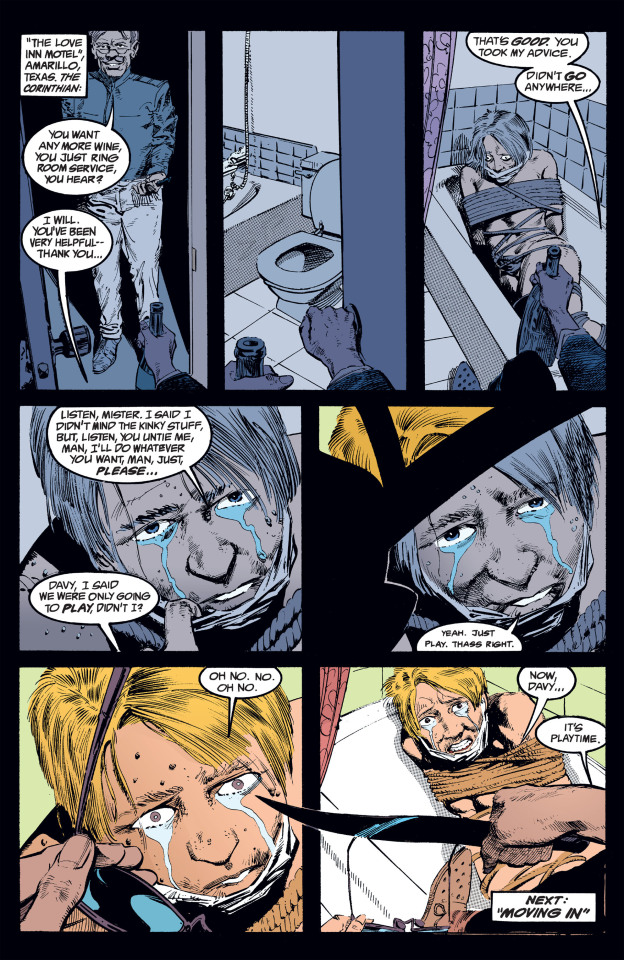
Let's compare the netflix scene with the comic. First, fundamental change: the reader's pov, which coincides exactly with that of the Corinthian. We do not see the Corinthian in the panels, and we will not see him until after a long time. We look at the scene through his eyes, we read the words through his voice. From this perspective, it's as if behind the glasses, together with him, we were there, an active part of this crime.
Paradoxically, this scene should be less scary than the one in the TV show. There is no blood and the boy still has his eyes. But we perceive his terror, we see him tied up and helpless like a doll. We see his pimply face making ugly grimaces of fear (in the netflix episode the victim's face is perfect). There is no hope for this boy and while he begs for mercy in vain we brandish, together with the Corinthian, the knife that will kill him. There is no sensuality, there is no seduction, there is no sex here (better, sex and death are the same thing but I will return to the relationship between death and sexuality in the second part of this little essay). We are in a room with no escape, the scene in front of us is dirty, not at all glamorous, in which we readers are actively participating. This Corinthian is fucking scary.
The waking world: a big doll's house to play in
This title takes on a different meaning depending on the various characters involved in this Sandman story. From my point of view, I believe that the characters who most of all are linked to the concept of a doll's house are Unity and the Corinthian.
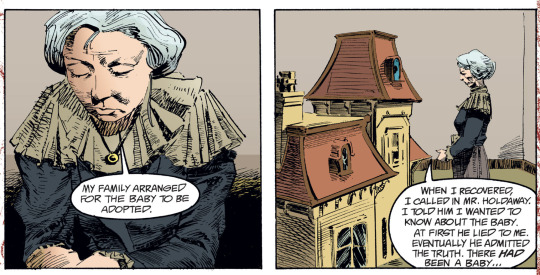
Unity appears near an old doll house, and her clothes are also similar to those of an old doll
Unity was literally a doll for most of her life: her condition was caused by an external event and external people decided about her life, including her motherhood.
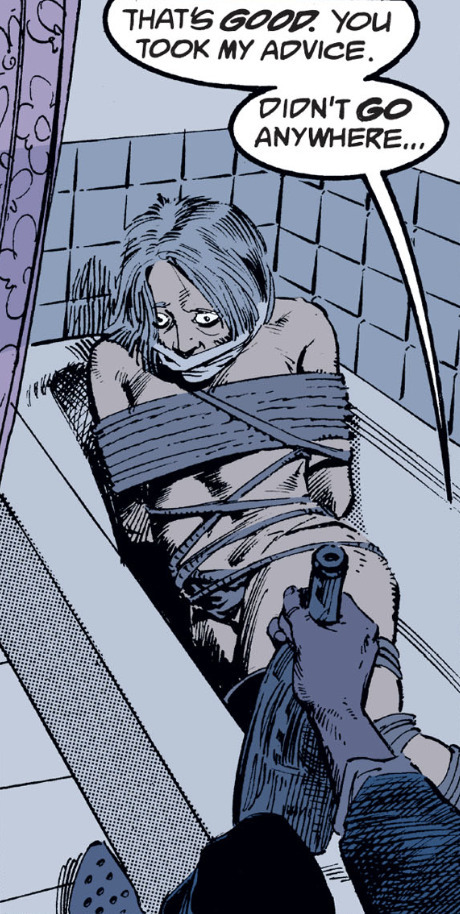
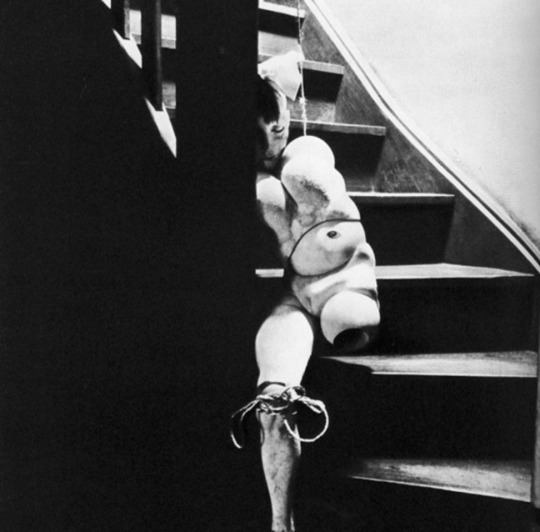
The Corinthian doll and the surrealist doll of Hans Bellmer: both obscene and disturbing toys
The Corinthian, on the other hand, is a sort of doll maker and the dolls are the human beings he kills and whose physiognomy he transforms with his knife.
This last thing is perhaps one of the elements that most differentiates the netflix Corinthian from the one in the comic. The Boyd Corinthian is almost a romantic character, a bohémien eager to savor human life in every sense, moved by contrasts and ambiguities that make him decidedly more similar to the Second Corinthian of the comic than to the First. He looks at humanity with a curiosity that is sometimes almost paternalistic: ruthless, but not cruel. He embodies a type of socially well-integrated serial killer, the "unsuspected type", who knows how to contain his impulses when necessary. Most important, with him sex is not always synonymous with death.
The Corinthian of comics, on contrary, never escapes this binomial: in him, sex and death are always intrinsically linked because they are the same thing. He is always cruel and brutal, seeing humans as meat to be cut. Humanity is nothing but fresh clay in his artist's hands: shaped dolls to play with in his new dark stories.
#the sandman#the corinthian#unity kinkaid#“this Dream people call Human Life” is from Brothers Quay's movie Institute Benjamenta#my writing#character analysis#the doll's house#the sandman book club
19 notes
·
View notes
Text
There's Something in the Water = Demons




"You're LYING" ~Crystal, Episode 7 He created a portal [to Hell?]!!!




Crystal, girl, you need to learn some demonology and get David's real name. He's some kind of aquatic-based demon. Some sort of brown fish based off Kelli Dunmore's costume Design.
Cat King and Monty had designs based off their animals. Even Esther FINCH had Finch-colored costumes.
@captainfantasticalright has god-tier posts on all the characters' costume designs. Here's the post on Crystal.
I've been noticing Crystal wears lots of brown, which seems to be the demon's color. You especially see these in relevant scenes with the demon, like when she's exorcised and wearing brown shorts.


She's got brown overalls on her hero color purple shirt when she confronts and buries David.
She also has a brown (demon) letterman jacket (reference to Charles' Harrington jacket -- in a boyfriend jacket vibe?) on with a hem that has burgundy/yellow-stripes (like Charles' collar). This is during the episode when she banished David from her head. She's still wrapped up in the concern of him.
Crystal similarly has the red and white stripe hem in ep 4 (with blue jacket to rep Edwin after she bonded with him in the Devlin house). I made a brief post on this here. Here's the image from it:

The demon's name is not David.

That's the human's name.

ALSO ON KELLI DUNSMORE'S WEBSITE she has pics of her work, including the costumes on Dead Boy Detectives, and she had THIS PICTURE FOR SOME REASON

Not really showing the costume design well in this shot that we NEVER SAW IN THE SHOW! Is this a deleted scene!?
I THINK THIS IS HUMAN!DAVID GETTING POSSESSED!!!!
In season 2, Crystal will need to learn the demon's True Name to banish him like Johanna Constantine did in Sandman.
What are we thinking this bitch looks like in his true form?

#season 2#predictions#theories#headcanon#the amazing shit you figure out when researching for fanfiction am i right#david the demon#crystal palace#crystal palace surname von hoverkraft#dbda#dead boy detectectives#dead boy detective agency#costume design#text post#demonology#sandman#sandman universe#the sandman#dead boy detectives netflix#dbda s2#dbda season 2#Spotify#kelli dunsmore#character analysis#long post
53 notes
·
View notes
Text
Wil Wheaton re-blogged this about Merv Pumpkinhead. I'll have to re-read Neil Gaiman's SANDMAN, as I was still living in Ohio when I originally read the entire 75 issue run. However, this seems to be a pretty sound theory.
Until next Time, I wish you...
All The Best,
James Heath Lantz
A theory about Merv
I have a theory about Mervyn Pumpkinhead. I’d say it’s a headcanon but it’s more a theory.

According to the tale of Stingy Jack (the origin of the jack-o-Lantern) we carve Jack-o-lanterns to drive away old Jack and other wandering ghosts. The Jack-o-lantern is a protection ward against supernatural threats from entering your home. One superstition has it that if you blow out the Jack-o-lantern before midnight on Halloween you invite evil spirits to enter your home for the entire year. It’s only safe to blow it out after midnight. Another superstition is if you let the Jack-o-lantern burn out naturally you invite good luck for the entire year and have warded your home against evil for the full year. It is especially good luck if it manages to burn until after sunrise. In The House with a clock in its walls Pumpkin Jack-o-lanterns are used as protection wards all year long. Jack-o-lanterns, at their heart, are symbols of protection. Now, because we see Mervyn as a Mervyn Turniphead in The Sandman story The Tempest, it’s very clear that his Jack-o-lantern head isn’t just for the aesthetic. In his Turnip form, that is an old school Irish Jack-o-lantern. That is a pre-Halloween decoration (use for any time of year) Protection symbol against supernatural threats.
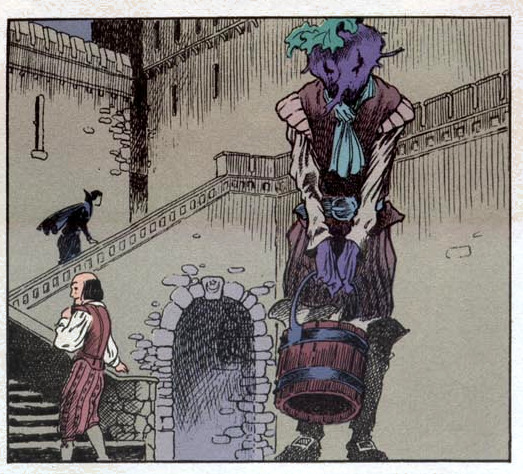
So even in present day when Mervyn has a modern Pumpkin Jack-o-lantern head, Mervyn is a walking, talking, protection ward against supernatural threats. He’s not just the groundskeeper or janitor. He’s a line of defense. This does explain why Mervyn stands up to The Furies (The Kindly Ones) the way he does.
And this is also one of the many reasons I, myself, love Jack-o-lanterns. They aren’t just symbols of Halloween. They are kind of comforting in their protective light.

5K notes
·
View notes
Note
Dream doesn't seem to have any good qualities at all unlike his siblings. He doesn't care about people, he's cruel, ruthless and selfish. He blames others for his problems and he doesn't care about those that live in the Dreaming.
Did... Did Desire send this in? 😂 Okay, I'll try and tackle this in three parts: 1) How does he compare in "good qualities" to the other Endless, 2) when does he actually show any good qualities, and 3) addressing the blaming others/lack of care for his subjects.
Note that there are some later-comics spoilers ahead, since I had to pull some examples from there. I have no idea how far you are in the story, so I couldn't limit examples to a specific non-spoiler time frame.
So, to address point #1, it kind of seems like the Endless in general lack a lot of redeeming qualities.
Destiny and Death are truly neutral in everything. Death gets good PR, basically, because she's friendly, but she's still ultimately neutral. Honestly even her friendliness gives me "really good at customer service" vibes rather than feeling like a sign that she'd actually be friendly or nice to anyone in particular.
Desire doesn't do anything especially heroic that we see; the best they do is giving Tiffany their coat when she escapes the burning strip club in Brief Lives. They do save Dream via Alianora in Overture, but even then it's with a nasty caveat. In addition, Desire's the one behind all the Walker family's supernatural problems. Heck, Desire only had the newer generations of Walkers so they could selfishly use them in their plans against Dream. In comics canon they're also a rapist.
Destruction's whole deal is running away from every problem--which indeed comes across as sensible compared to his siblings. He mostly just likes being left alone with his cooking and bad art. But, he has no qualms whatsoever about killing innocents in order to keep running away.
Despair... we don't really get to see her do much so I think she falls under the "neutral" category too.
Delirium is too out of it to really do much intentionally, and what we *do* see her do intentionally is reckless driving and giving an eternal spiders hallucination-curse to the traffic cop who tries to stop her. Her irrational determination to see her brother continues even after it's clear it's actively causing people to get hurt. She doesn't seem to care about people for sure.
So, like. This entire family sucks. I'm not sure I'd say Dream is particularly worse, we just happen to see more of his issues because he's the main character.
Okay, now on to point #2. He does indeed care about others, on occasion, and also has unambiguously heroic moments.
In terms of "caring about others", he's the one who tries to call off the road trip in Brief Lives when he realizes that Destruction's alarms are killing people (although he doesn't find out Destruction is behind the deaths until Death forces him to continue the road trip for Delirium's sake). He seems highly disturbed by Ruby's death in particular, which is part of why I was so peeved at The Sandman Companion giving HIM the blame for it.
He's also canonically good with children; it's just adults he's terrible with. He's nice to the girl on the plane in Brief Lives, he entertains a group of children on a dream-adventure when we see him going about his duties in The Kindly Ones, and Calliope notes in The Wake that his issues with Orpheus apparently didn't start until Orpheus grew up. In Overture he's also kind and protective toward the alien girl Hope.
As for "heroic" moments... okay, I really had to think for some of these, but they ARE there.
Rescuing Calliope is probably the most unquestionably "heroic" situation he's in, since he was not the cause of the situation in the first place, and also has nothing to gain by helping. But he does help her, nonetheless.
Also, he takes hundreds of serial killers off the streets by stripping them of their beliefs at the Cereal Convention. It's hard to say that wasn't a positive move. Plus, one of the reasons he dislikes The Corinthian could be that Cori was causing so much harm to people in the first place.
Even before his big fishbowl time-out, Dream tells off Hob for participating in the slave trade and disapproves of slavery. (I'm going to ignore what The Sandman Companion says about that here...)
He helps Marco Polo out of the Soft Places desert, even though he himself had just barely escaped the fishbowl and wasn't sure if he had enough power to save both himself and Marco.
In my favorite issue ever, Fear of Falling, he gives Todd the advice he needs to get over his crippling fears in both the real world and the dream world.
Also, his treatment Nuala is a good indication that he's not the worst. Nuala gets gifted to him as a slave, to do "whatever he pleases" with... and his first instinct would be to reject such a gift entirely, but since he is bound by the fae's customs to accept any gift, he just basically lets her live in his castle rent-free. She takes up cleaning so she has something to do; he didn't even ask her to do that! His only demand is that she not use her glamour. If he were truly as cruel and uncaring about consent as some analyses (including parts of The Sandman Companion) would have you believe, it's doubtful that he'd treat an intended sex slave that way.
(Of course, if I were being uncharitable, I could point out that non-glamour Nuala is not conventionally attractive, and it could be something about him only being able to respect a woman if she's not sexually attractive to him... but I'm *trying* to be charitable to Morpheus here, for once)
And now for #3: Not caring about the Dreaming residents and blaming others for everything.
Admittedly, in the comics it is harder to tell specific instances about caring for the Dreaming residents, but there are a few. A big one is that he granted Lucien's wish to become a librarian rather than staying as a raven. Another is Abel's story about how he came to live in the Dreaming; Dream offered it to him as a gift, and when he was lonely he also brought Cain and gave Cain a house as a gift toward Abel.
I've been trying to keep this to the comics-universe for consistency's sake, but the show-universe definitely gives way more examples about him caring about his subjects. He gives Goldie to Cain and Abel to replace their gargoyle he had to absorb, he clearly cares about Jessamy and cries over her death, and he seems more upset about his subjects abandoning the realm as a personal abandonment instead of just a "they're my citizens so they should stay here" type deal. Of course, he also granted Lucienne her wish to become a librarian here as well.
And as for blaming others for everything... whew. That's a big one. Because even though he may have done that on some significant occasions (Nada being the biggest one that we see), ultimately, he ends up blaming HIMSELF for everything to an unreasonable degree. I actually won't discuss further examples on this one because it would be massive ending spoilers, but yeah, suffice it to say he overcorrects on that front.
So yes, for Morpheus, I think I'd paraphrase a line from Guardians of the Galaxy (2014) that I think describes him well: He's an asshole, but not 100% a dick.
youtube
#ask#asks answered#anon#the sandman#the sandman meta#dream of the endless#character analysis#long post
33 notes
·
View notes
Text
The Thing About Daniel…
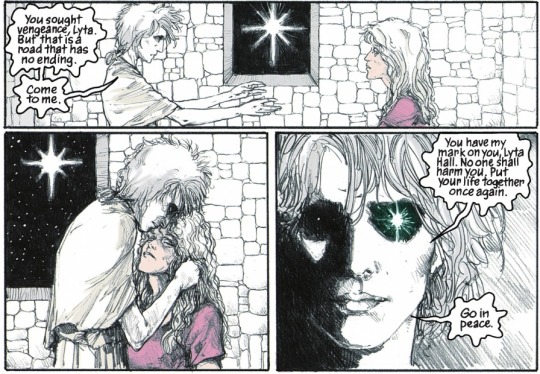
The whole point of Daniel is that he’s kinder and softer. He forgives where Morpheus wasn’t able to. It’s essentially on the page—he even forgives Alex Burgess and Richard Madoc: The very people Morpheus let hang in limbo, caught in their own worst nightmares. I’m not saying it isn’t deserved, or the reasons aren’t at least understandable, but choosing vengeance is still a choice. And Daniel chooses forgiveness and kindness, even for these people. It’s so explicit, even in the words he says to Lyta above:
“Vengeance is a road that has no ending.”
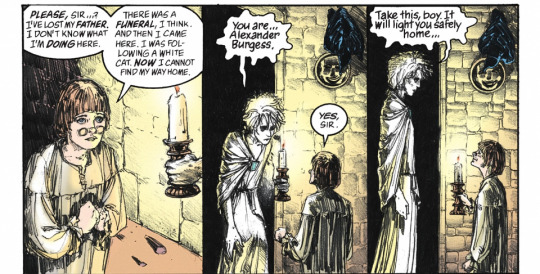
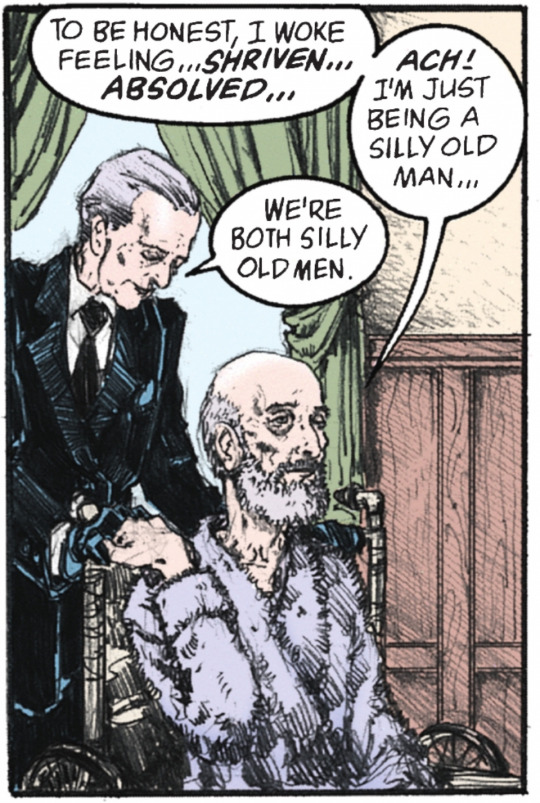
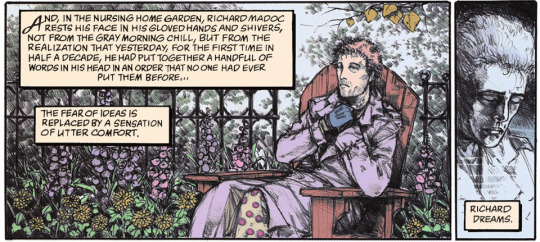
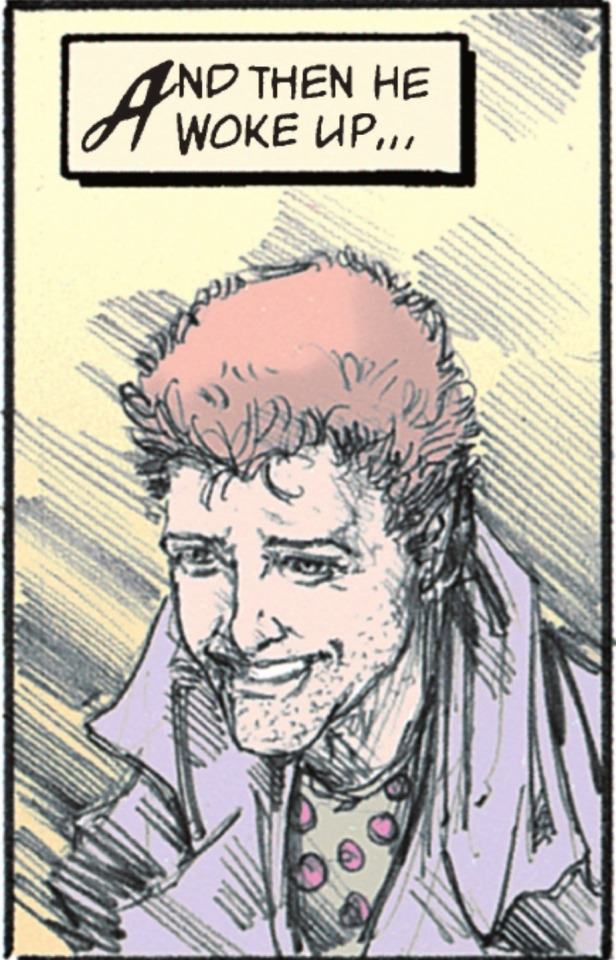
That’s why I personally dislike what some of the newer comics did to Daniel, because in my view, it goes against what is essentially the whole point:
If you turn Daniel into someone who chooses vengeance over forgiveness, hard feelings over kindness, you’re back to this:
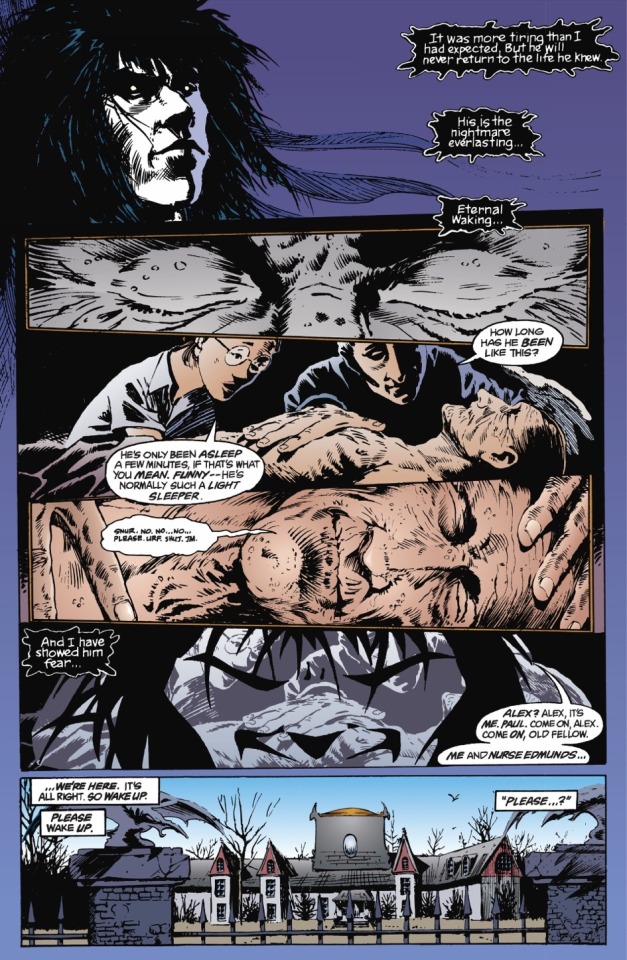
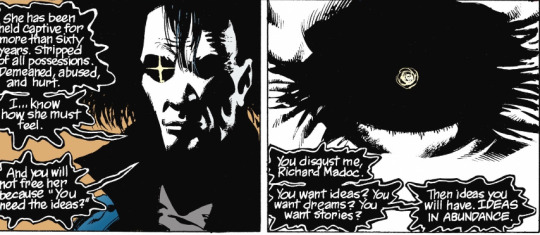
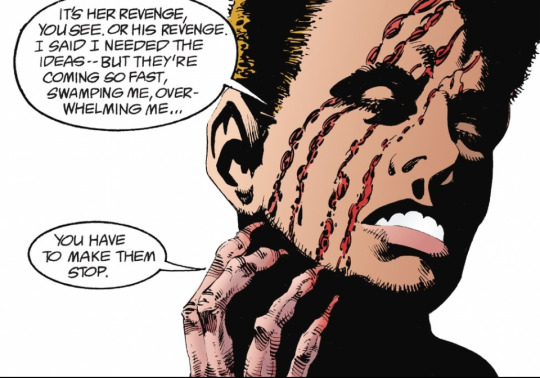
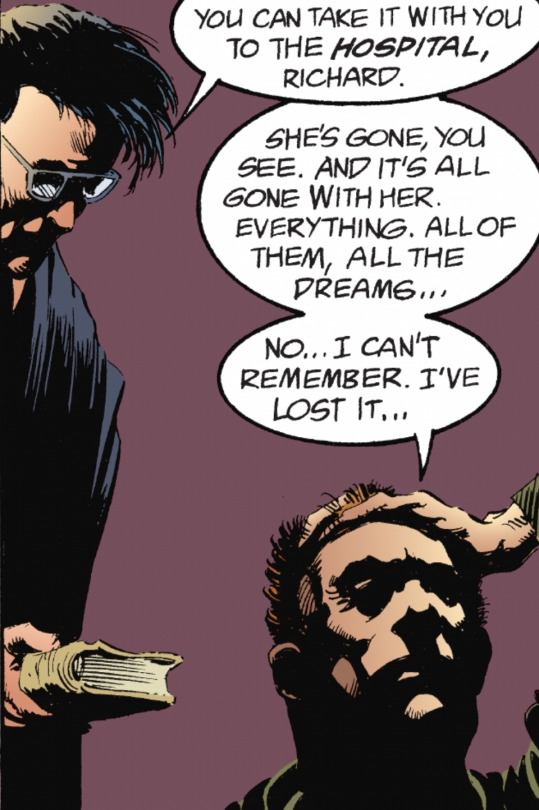
And that would render both Morpheus’ and Daniel’s arcs pointless. It would do both of them a disservice. To one because he did learn, and understood enough about himself to come to a conclusion. To the other because he is both said conclusion and the solution.
The whole, deeply metaphorical point is that it’s about change, because Dream is still Dream, but with a new point of view while still remembering the old…
#the sandman#sandman#dream of the endless#morpheus#daniel hall#daniel!dream#sandman meta#sandman character analysis#sandman analysis#the wake#sandman spoilers#the wake spoilers#sandman bookclub#alex burgess#richard madoc
206 notes
·
View notes
Text

Carol crumbs cause it's been a busy week 💦
Slightly deeper analysis below ↴
LM: This little kid won't stop getting in the way since the 80's! He's getting tired of seeing him but he can't help but feel intrigued by his strength
GJ: They've shared a couple words on the waiting room at the neurologist, though Carol only goes bc he goes to moshpits and shows up lightheaded on training the next day
VK: Carol thinks that the retired military to boxer thing is pretty metal, VK is happy to tell him his stories (also slight crush on VK bc he's still a self insert of mine 😼)
DK: Disco is better at the dancefloor than the ring, Carol is the opposite. Carol has gone to a few kickboxing classes with Disco for fun (they were a mesa) and they enjoy learning each other's dance styles
KH: Carol has asked him to teach him how to growl like him, "your voice is so metal" King Hippo doesn't really understand what he means tho
PH: Piston often helps Carol cool down if he gets too intense. Have gone to a Babymetal concert together. Btw Carol is friends with everyone in the Mayor circuit :D
BH: Friends. Kinda like a cool uncle to Carol, "you can't not get along with this guy!". They have fun at the grill
GT: Friends, though Tiger seems to get along better with his clones so they're not very close
DF: As fellow Spanish speakers early on the WVBA friendship was quick to spark. However their rankings on the latest instalment made Carol jealous, and rivalry was a lot more evident. Don would shove on his face how popular he was amongst women and how cool his Mayor circuit belt looks on him too. Outside the ring they're still good friends tho! The chase of the champion title is the one thing turning their friendship a bit rocky
AR: Two crazy freaks bonding over national dances and aggressive fighting style? Yeah
BB: He's aware that his whole character is about being intimidating and strong like a wild animal but thinks he takes it a bit too far. Carol's character also plays that role but messing with the ref and throwing dumbbells to the public is just disrespectful. He's thought that maybe there's something underneath that facade but it's just hard to see through him.
SP: They've shared one too many drinks before but they end up too hungover to remember they're friends or had a great time last night
SMM: They have clashing personalities. However one day they're calling each other names and the next one they're doing silly stuff like dancing or putting makeup on together. They both seem to have a single braincell that pair up in random moments.
MS: Carol grew up admiring Mr Sandman's intimidating personality and incredible strength. He was scared af to actually meet him in the WVBA but after his crushing defeat (Expected) he turned out to be a chill guy! They listen to heavy metal and go to concerts together, Carol helped him pick his theme for the Wii instalment too. They like to blast metal at the gym to have it all for themselves
DL: Carol rarely talks to Mac soo how's he supposed to know anything beyond that?
R: He kinda misses Mario cause he wouldn't let any of the boxers shove him or throw him off the ring. Doesn't like his lack of authority pretty much
C: I mean he's already friends with Don so how wouldn't he know his gf
44 notes
·
View notes